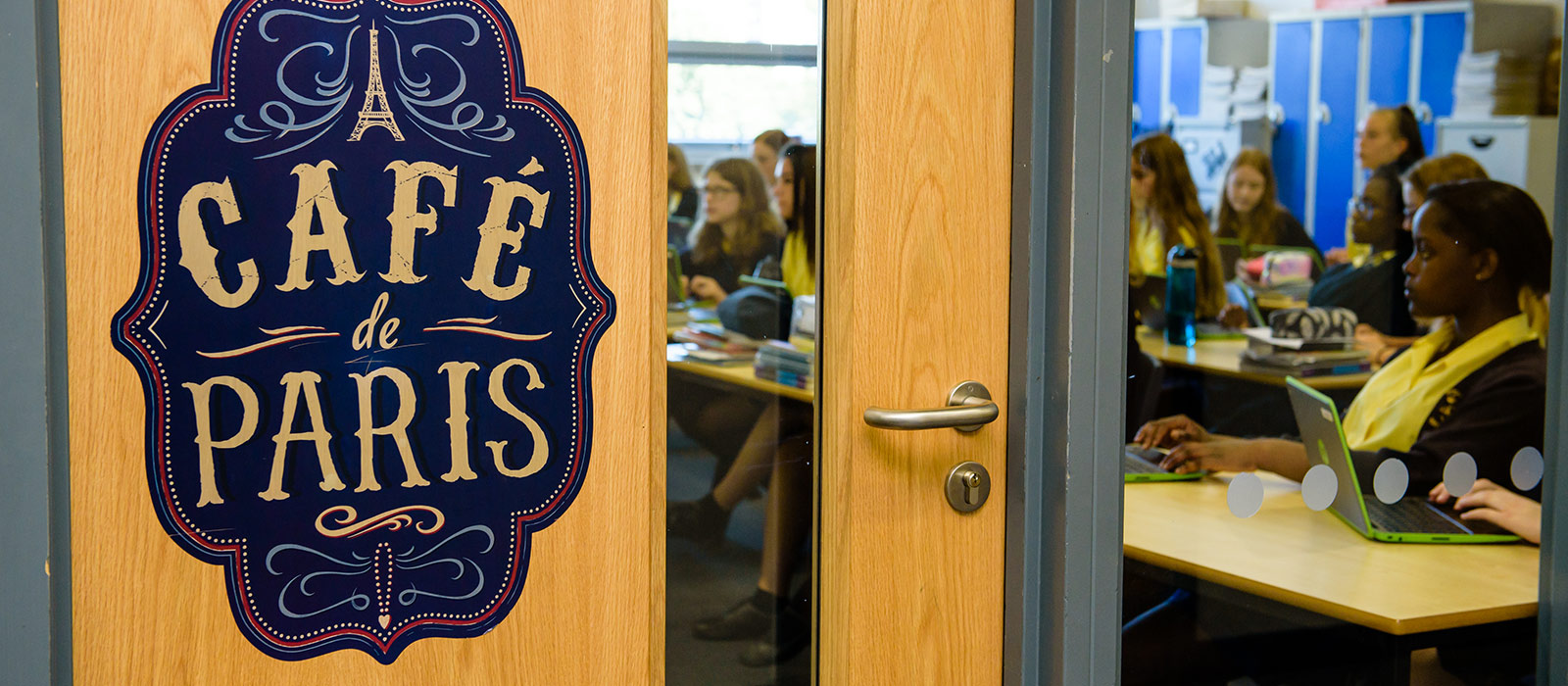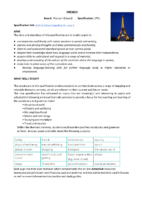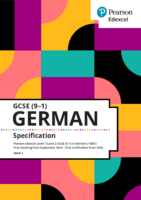Modern Foreign Languages
The Bishop’s Hatfield Girls’ School linguist learns through interaction with others, imagines, creates and plays with language, never worries, is confident, takes risks and learns from mistakes, gets pleasure from using language, enthuses about it, uses every opportunity to express new ideas, and is internationally aware, exploring other cultures, showing passion and curiosity for languages, and is tenacious; that’s all of us, students and staff!
Curriculum
KS3
The school offers two of the following foreign languages to pupils in Year 7 in rotation: French, German and Spanish. Pupils will continue to study these two languages throughout Key Stage 3. In 2023-2024 the languages offered were German and French. The new intake in September 2024 will study German and Spanish and in September 2025 French and Spanish.
Year 7:
Pupils will cover the following topics and related grammar:
- Greetings, introducing oneself, birthdays and age, classroom objects
- Describing family and friends
- Clock times, where you live, evening activities
- Towns, opinions snacks and directions
- Daily routine, clock times, giving reasons,
- Leisure activities: sports, games, music, holidays
- School and cultural content
- Translation to and from the foreign language
Year 8:
- Families, jobs, weather, daily routine
- Free-time (Past tenses), TV programmes and opinions, last weekend…
- Invitations, excuses, clothes, comparatives and superlatives
- Food and drink, quantities
- Travel and holidays, cultural content
- Talking about friends, pocket money, (French only) using 3 tenses
- Health and fitness (German)
Translation to and from the foreign language
Year 9:
- Leisure activities
- Past and future tenses
- Talking about the future
- Health issues
- Describing people in greater depth
- Travel – cultural content
- Young people and their rights / Work
- School (German)
- Extend sentence using more complex clauses
- Translation to and from the foreign language
KS4
The vocabulary in this qualification enables students to communicate across a range of engaging and relatable thematic contexts, which are relevant to their current and future needs. The new specification has refocused on topics that
are meaningful and interesting to pupils, and selected the following six broad thematic contexts to provide a focus for the teaching and learning of the vocabulary and grammar listed:
- My personal world
- Lifestyle and wellbeing
- My neighbourhood
- Media and technology
- Studying and my future
- Travel and tourism
The aim is to develop pupils’ ability to communicate confidently, express and develop thoughts and ideas spontaneously and fluently, listen to and understand clearly articulated, standard speech, deepen their knowledge about how language works and understand the culture of the countries where the language is spoken. For more information about GCSE courses, please see the link under Further Information below and these links:
KS5
Examination Board: Edexcel – A Level (AQA) French and Spanish are studied within the Welwyn Hatfield Consortium.
In today’s international world a modern language is a major asset, which combines well with all other subjects to provide an invaluable life skill.
Each language is taught through a series of topics, based on current issues, such as social, political and artistic trends, culture, literary texts and/or a film.
The topics include the changing nature of the family, the cyber-society, voluntary work, immigration and law and order. Students will also study cinema, literature and music. A stimulating range of material from the Internet, up to date textbooks and authentic articles will be used to teach.
The lessons will include debates, presentations, supported by ICT. The speaking exam includes a discussion on an individual research project of the student’s own choice.
Visits/Extra Curricular:
- MFL House events include Spelling Bees and cultural competitions.
- The Faculty has links with schools abroad and pupils have the opportunity to establish penfriend / e-links with French peers.
- The Faculty also offers annual trips open to Year 9 and 10 pupils.
- The annual Year 10 Young MFL Leader programme culminates in a Language Discovery Day for primary school pupils hosted by the Year 10 Young Leaders.
- A variety of Enrichment Clubs are scheduled to support foreign language learning.
Further Information:
Exam Boards:
Pearson GCSE:
AQA A level: http://www.aqa.org.uk/subjects/languages/as-and-a-level
Useful MFL Links:
Languages Online: http://languagesonline.org.uk/Hotpotatoes/Index.htm
BBC KS 3 Bitesize: https://www.bbc.com/education/subjects/z2nygk7
BBC GCSE Bitesize: https://www.bbc.com/education/subjects/zhsvr82
Quizlet: https://quizlet.com/ (then search by Course book name and unit)
BBC Learn French: http://www.bbc.co.uk/languages/french/
TV5: (French KS4 & 5): http://apprendre.tv5monde.com/?utm_source=tv5monde&utm_medium=metanav&utm_campaign=langue-francaise_apprendre-le-francais
BBC Learn German: http://www.bbc.co.uk/languages/german/
DW: (German KS4+) http://www.dw.com/en/learn-german/s-2469
Spanish: http://www.bbc.co.uk/languages/spanish/
Bi-lingual Online Dictionaries: https://www.collinsdictionary.com/
Assessment
In Key Stage 3 and Year 10 pupils are assessed in all skills three times over the course of the year which build on prior learning. Year 11 pupils sit a full mock exam at the end of the Autumn term. .
Home-Work
Home-Work is set after every lesson and pupils may be asked to review new vocabulary and structures covered in the lesson or to research and prepare work for the subsequent lesson. They may be asked to complete grammar exercises, use Google Classroom to collaborate on a task, use online resources for listening practice or prepare oral answers. The Faculty encourages pupils to build their resilience and independent learning skills.
It is expected that all pupils will have access to a bi-lingual dictionary for both languages studies at home which will compliment the text book provided.











